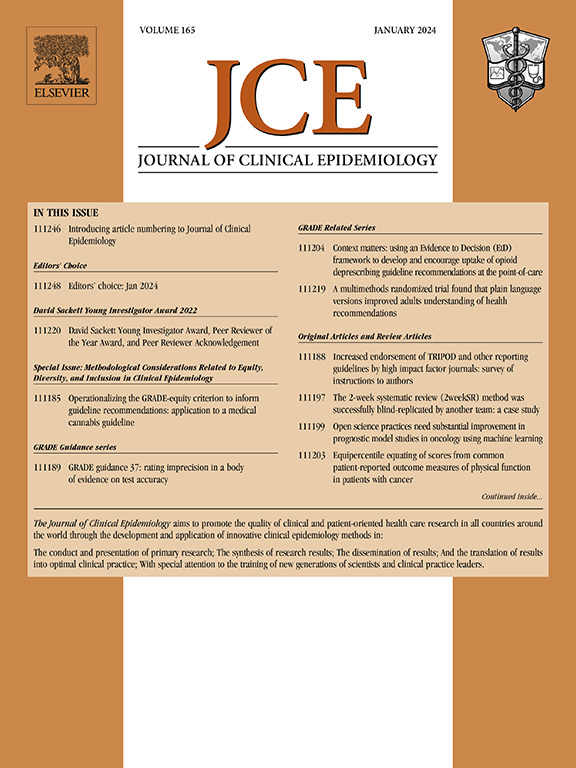公共试验数据库中介入试验的数据质量评估。
IF 7.3
2区 医学
Q1 HEALTH CARE SCIENCES & SERVICES
引用次数: 0
摘要
目的:临床试验数据库中的高质量数据录入对研究结果的实用性、有效性和可复制性至关重要,因为它影响着循证医学实践和未来研究。我们的目的是评估试验登记中自我报告数据的质量,并提出识别和评估数据质量的实用而系统的方法:我们在ClinicalTrials.Gov网站上搜索了2000-2015年间的介入性全膝关节置换术(TKA)试验。我们提取了必要的和可选的试验信息要素,并使用了 CTG 的变量定义。我们对有关数据质量报告的框架、核对表和医疗数据库违规概述进行了文献综述。我们确定并评估了数据质量属性:一致性、准确性、完整性和及时性:结果:我们纳入了 816 项介入性 TKA 试验。数据不规范程度差异很大:从 0% 到 100% 不等。不一致性从0%到36%不等,最常见的是非随机标记分配与 "单组 "分配试验设计相结合。不准确率从 0% 到 100% 不等。不完整性从0%到61%不等:61%的TKA试验未报告结果。在及时性不规范方面:49%的试验在开始日期超过3个月后才登记:我们发现已登记的临床 TKA 试验在数据质量方面存在很大差异。试验发起者应致力于确保其提供的信息可靠、一致、及时、透明和准确。CTG 的用户在根据注册数据得出结论时需要保持批判精神。我们相信,这种意识将提高对已发表文章和治疗方案的明智决策,包括复制和改进试验设计。本文章由计算机程序翻译,如有差异,请以英文原文为准。
Data quality assessment of interventional trials in public trial databases
Objective
High-quality data entry in clinical trial databases is crucial to the usefulness, validity, and replicability of research findings, as it influences evidence-based medical practice and future research. Our aim is to assess the quality of self-reported data in trial registries and present practical and systematic methods for identifying and evaluating data quality.
Study Design and Setting
We searched ClinicalTrials.Gov (CTG) for interventional total knee arthroplasty (TKA) trials between 2000 and 2015. We extracted required and optional trial information elements and used the CTG's variables' definitions. We performed a literature review on data quality reporting on frameworks, checklists, and overviews of irregularities in healthcare databases. We identified and assessed data quality attributes as follows: consistency, accuracy, completeness, and timeliness.
Results
We included 816 interventional TKA trials. Data irregularities varied widely: 0%–100%. Inconsistency ranged from 0% to 36%, and most often nonrandomized labeled allocation was combined with a “single-group” assignment trial design. Inaccuracy ranged from 0% to 100%. Incompleteness ranged from 0% to 61%; 61% of finished TKA trials did not report their outcome. With regard to irregularities in timeliness, 49% of the trials were registered more than 3 months after the start date.
Conclusion
We found significant variations in the data quality of registered clinical TKA trials. Trial sponsors should be committed to ensuring that the information they provide is reliable, consistent, up-to-date, transparent, and accurate. CTG's users need to be critical when drawing conclusions based on the registered data. We believe this awareness will increase well-informed decisions about published articles and treatment protocols, including replicating and improving trial designs.
求助全文
通过发布文献求助,成功后即可免费获取论文全文。
去求助
来源期刊

Journal of Clinical Epidemiology
医学-公共卫生、环境卫生与职业卫生
CiteScore
12.00
自引率
6.90%
发文量
320
审稿时长
44 days
期刊介绍:
The Journal of Clinical Epidemiology strives to enhance the quality of clinical and patient-oriented healthcare research by advancing and applying innovative methods in conducting, presenting, synthesizing, disseminating, and translating research results into optimal clinical practice. Special emphasis is placed on training new generations of scientists and clinical practice leaders.
 求助内容:
求助内容: 应助结果提醒方式:
应助结果提醒方式:


